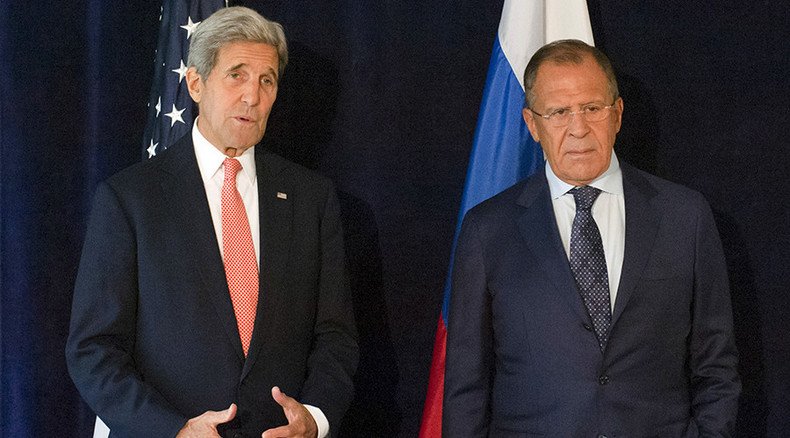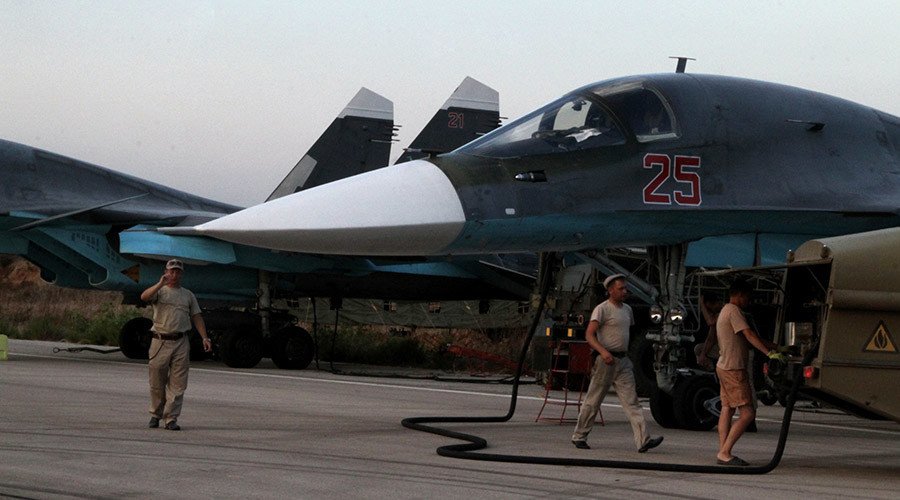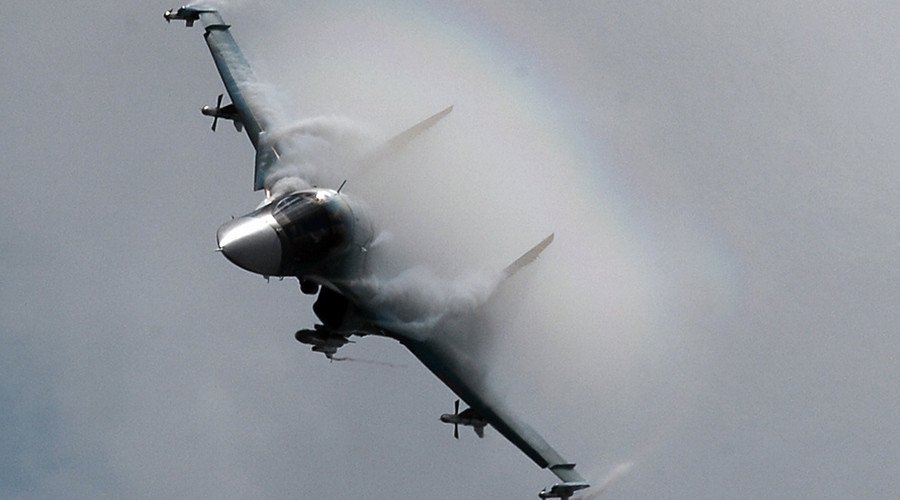Russia and US in indirect military confrontation over Islamic State

Given the propaganda cover ISIS provided the US, ISIS has been increasingly regarded de facto as a US proxy. Now that Russia is bombing ISIS, the US and Russia are in indirect military confrontation for the first time since the end of the Cold War.
Modern warfare is not an easy situation to unpick. The old paradigms of war – which sports like rugby and cricket were meant to model – are long gone.
A better metaphor for what we have now might be an online video game with an unknown number of players any number of whom may be fighting on behalf of outside corporate agencies (which may or may not have stock in the other players as well), most of whom are hiding behind fake IP addresses.
So I’m not here to talk about goodies and baddies. The realpolitik situation is so tangled that the Cowboys and Indians dynamic doesn’t cut it – at least for me.
READ MORE: ‘Reality in Syria very different from what US says’ – Assad advisor
The US created the Taliban. This is not a wild conspiracy theory. It’s a verifiable fact. We know that they were organized and supported – at least in part – by Zbigniew Brzezinski to destabilize the Russian occupation of Afghanistan. We have video footage of him telling the bearded warlords in the country that God is with them. And Al Qaeda – though in an on-again-off-again fashion – is broadly allied with the Taliban.
ISIS and Al Qaeda are ideologically comparable and certainly related. Who created and funded ISIS is a moot point, so I will leave it. What I will say is that it has habitually driven in convoy across open desert unmolested using equipment and vehicles provided in large part – however circuitously – by the US government. ISIS also has suspiciously good marketing materials. And the existence of ISIS has meant that the US could pursue the aim of regime change in a sovereign state, this time in Syria.
And ISIS has never done so much as cough in the direction of Israel.
So while it may be going too far to claim ISIS to be a direct arm of US policy – that is, a proxy – its goals and actions are so useful to the US administration that in many people’s eyes the connection is all but official.
However farcical it may seem, the problem the US faced was that it could not deal properly with ISIS without blowing the justification it needed for continuing to attack yet another country which had done nothing to hurt either it or its legitimate interests.

Now Putin has stepped up to the plate.
Putin’s rhetoric is much more circumspect and restrained than mine. While clearly incensed by US exceptionalism and hubris the most he really accuses the US of is gross unprofessionalism.
READ MORE: All countries fighting against ISIS must be supported – French MP
He chooses to take the line not that the US has planned and implemented the wholesale destruction of Iraq, Libya and Syria – and he would have strong grounds to do so given the PNAC document drawn up by the so-called hawks under Dick Cheney – but rather that it is has simply mismanaged its affairs.
This is smart.
So instead of Putin laying himself open to the charge that he is a wild-eyed conspiracy nut – which he would have done had he accused the US of purposely creating this mess – he has taken the tack that the US has simply done an unacceptably bad job of clearing this mess up.
In short, he has called America’s bluff.
And as Russia moves in to clean house and the predictable propaganda war warms ups with Russia’s detractors accusing it of exacerbating an already bad situation, there is acknowledgement even among straight-laced Western media that Russia has moved into a dominant position internationally – as voiced, for example, by Charles Crawford in The Telegraph.
But leaving propaganda tensions to one side, we are left with an uncomfortable situation – one which is perhaps beyond the pale of what Western media will touch, and it is this: since ISIS actions have advanced US aims, in functional terms it is a US proxy. And since Russia is now openly engaged in doing what the US would not do – using air power to take out ISIS positions – the US and Russia are now in effect in a state of live military confrontation.

Also, Russia is unlikely to make the distinction between ISIS on the one hand and the other leading rebel organizations such as Jabhat al-Nusra and Ahrar al-Sham on the other that the US would like it to make.
Judging from Putin’s rhetoric, his mandate is to act within international law and provide support to the legitimate government of a country which has asked for help. And if that is the case, Russian policy is going to be guided by a simpler paradigm than checking who is a ‘moderate’ rebel and who a ‘fanatic’.
Many - and not only within Russia – have regarded NATO’s destruction of country after country as rank criminality. And many – myself included – are sickened at the brazen hypocrisy with which such actions have been carried out.
It would be easy now that Russia seems at last to have stepped in to imbue its actions with the motives one would like it to have, and online many openly crow that Putin has faced down Obama and is standing up to those forces which direct US policy.
I would like to feel that way, but I counsel caution.
From what I’ve seen of how the world works there are usually at least three reasons behind major events: the first is the ostensible reason sold to the public, the second is what is believed in a closed inner circle of people closer to power, and the third reason is the real reason.
And what the real reason is at this point, I simply don’t know and it is too early to guess.
Certainly, live battle situations give all participants the chance to prove new hardware in the field. Russia is a major arms producer and it would be reasonable to expect it to want to maximize its return on investment.
And it is also true that Putin has gained a lot of political capital out of being seen to try to do in fact what the US was simulating but not doing: drive ISIS from Syria and restore order.
To what extent his actions will meet the expectations of those who are weary of US hubris, and how and where mission-creep will morph this project into something none of us wanted or expected, only time will tell.
The statements, views and opinions expressed in this column are solely those of the author and do not necessarily represent those of RT.













